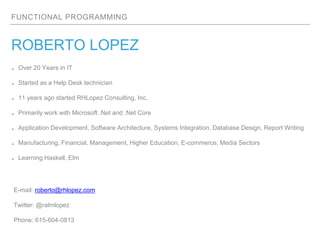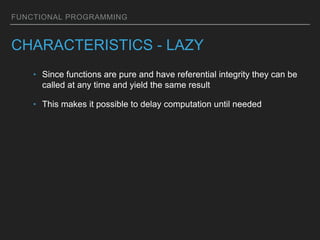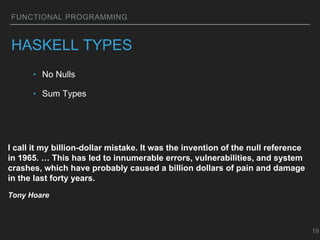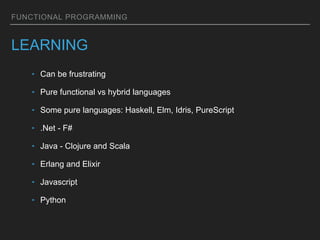Functional Programming Introduction
- 1. I WROTE A FUNCTION, AM I A FUNCTIONAL PROGRAMMING
- 2. FUNCTIONAL PROGRAMMING DEVSPACE WOULD LIKE TO THANK OUR SPONSORS
- 3. FUNCTIONAL PROGRAMMING ROBERTO LOPEZ Over 20 Years in IT Started as a Help Desk technician 11 years ago started RHLopez Consulting, Inc. Primarily work with Microsoft .Net and .Net Core Application Development, Software Architecture, Systems Integration, Database Design, Report Writing Manufacturing, Financial, Management, Higher Education, E-commerce, Media Sectors Learning Haskell, Elm E-mail: roberto@rhlopez.com Twitter: @ralmlopez Phone: 615-604-0813
- 4. FUNCTIONAL PROGRAMMING MOTIVATION Ō¢Ė Teach to learn Ō¢Ė First conference talk Ō¢Ė Helping others through my experience
- 5. FUNCTIONAL PROGRAMMING Ō¢ĖWhy should I care? Ō¢ĖWhat is it? Ō¢ĖCharacteristics Ō¢ĖLearning Ō¢ĖResources OVERVIEW
- 6. FUNCTIONAL PROGRAMMING WHY SHOULD I CARE? ŌĆŻ A different way of thinking / solving a problem ŌĆŻ Less typing (succint) ŌĆŻ Higher levels of abstraction ŌĆŻ Easier to reason about a program ŌĆŻ Less bugs - no nulls, sum types
- 7. FUNCTIONAL PROGRAMMING WHAT IS IT? ŌĆ£Functional programming is so called because its fundamental operation is the application of functions to argumentsŌĆØ John Hughes, Why Functional Programming Matters
- 8. FUNCTIONAL PROGRAMMING WHAT IS IT? ŌĆ£Functional programming is a computer programming paradigm that relies on functions modeled on mathematical functions. The essence of functional programming is that programs are a combination of expressions. ŌĆØ Haskel Programming from First Principles, Chris Allen and Julie Moronuki 8
- 9. FUNCTIONAL PROGRAMMING WHAT IS IT? ŌĆŻ Based on lambda calculus - Alonzo Church 1930s ŌĆŻ Turing complete ŌĆŻ ╬╗x.(x + 1) => ╬╗x.(x + 1) 3 => [x := 3] => 3 + 1 => 4 ŌĆŻ Expressions, variables, and abstractions ŌĆŻ Expressions = variables | abstractions ŌĆŻ Abstractions = functions 9
- 10. FUNCTIONAL PROGRAMMING CHARACTERISTICS ŌĆŻ Functions are First-Class, Higher-Order ŌĆŻ Pure Functions (No Side-Effects) ŌĆŻ Referential Transparency ŌĆŻ Immutability ŌĆŻ Currying ŌĆŻ Partial Application ŌĆŻ Recursion ŌĆŻ Lazy
- 11. FUNCTIONAL PROGRAMMING CHARACTERISTICS - FUNCTIONS FIRST-CLASS ŌĆŻ Functions treated as first-class variables ŌĆŻ Can be passed to functions as parameters ŌĆŻ Can be returned from functions ŌĆŻ Functions that take or return functions are called higher-order functions
- 12. FUNCTIONAL PROGRAMMING CHARACTERISTICS - PURE FUNCTIONS ŌĆŻ Functions only operate on the inputs given ŌĆŻ No side-effects 12
- 13. FUNCTIONAL PROGRAMMING CHARACTERISTICS - REFERENTIAL TRANSPARENCY ŌĆŻ Functions yield the same result for a given input
- 14. FUNCTIONAL PROGRAMMING CHARACTERISTICS - IMMUTABILITY ŌĆŻ Data is immutable, it cannot be changed once declared ŌĆŻ Functions return a copy of the data with the new changes 14
- 15. FUNCTIONAL PROGRAMMING CHARACTERISTICS - CURRYING ŌĆŻ Functions take one argument and return one result
- 16. FUNCTIONAL PROGRAMMING CHARACTERISTICS - PARTIAL APPLICATION ŌĆŻ Fix a number of arguments to a function to produce another function of smaller arity
- 17. FUNCTIONAL PROGRAMMING CHARACTERISTICS - RECURSION ŌĆŻ Heavily used and often the only way to iterate
- 18. FUNCTIONAL PROGRAMMING CHARACTERISTICS - LAZY ŌĆŻ Since functions are pure and have referential integrity they can be called at any time and yield the same result ŌĆŻ This makes it possible to delay computation until needed
- 19. FUNCTIONAL PROGRAMMING HASKELL TYPES ŌĆŻ No Nulls ŌĆŻ Sum Types I call it my billion-dollar mistake. It was the invention of the null reference in 1965. ŌĆ” This has led to innumerable errors, vulnerabilities, and system crashes, which have probably caused a billion dollars of pain and damage in the last forty years. Tony Hoare 19
- 20. FUNCTIONAL PROGRAMMING LEARNING ŌĆŻ Can be frustrating ŌĆŻ Pure functional vs hybrid languages ŌĆŻ Some pure languages: Haskell, Elm, Idris, PureScript ŌĆŻ .Net - F# ŌĆŻ Java - Clojure and Scala ŌĆŻ Erlang and Elixir ŌĆŻ Javascript ŌĆŻ Python
- 21. FUNCTIONAL PROGRAMMING RESOURCES ŌĆŻ Haskell Programming from first principles - Chris Allen and Julie Moronuki ŌĆŻ Programming Elm - Jeremy Fairbank ŌĆŻ Haskell Weekly ŌĆŻ Elm Town, Javascript to Elm ŌĆŻ Functional Geekery ŌĆŻ Lambda Cast
- 22. WHACK A BUG QUESTIONS? THANK YOU









![FUNCTIONAL PROGRAMMING
WHAT IS IT?
ŌĆŻ Based on lambda calculus - Alonzo Church 1930s
ŌĆŻ Turing complete
ŌĆŻ ╬╗x.(x + 1) => ╬╗x.(x + 1) 3 => [x := 3] => 3 + 1 => 4
ŌĆŻ Expressions, variables, and abstractions
ŌĆŻ Expressions = variables | abstractions
ŌĆŻ Abstractions = functions
9](https://image.slidesharecdn.com/functionalprogramming-191014151935/85/Functional-Programming-Introduction-9-320.jpg)












